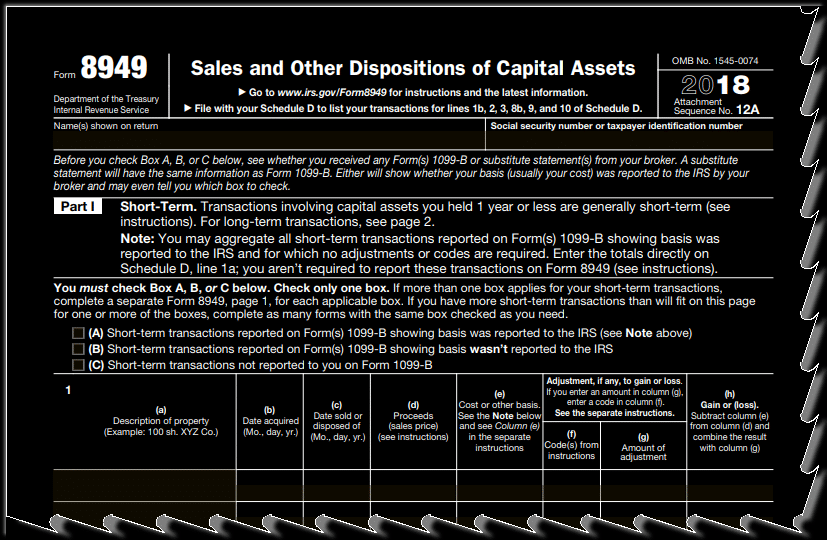Calculating your Bitcoin taxes every year needn’t be a stressful or troublesome process. Learn the basics of capital gains tabulation, and you’ll be able to prepare your own Federal income tax return with confidence. Once you have a handle on the basics, you’ll also be better equipped to confer with your CPA or accountant at tax time.
Here’s an overview of Federal income taxes as applied to your Bitcoin gains.
A Short-Term Capital Gain Example
- You bought $10,000 of BTCUSD on February 7, 2018
- BTCUSD price per unit: $8,000
- BTCUSD units acquired: 1.25
- Transaction fees: $150
Cost basis: $10,150
- You sold 1.25 units BTCUSD on February 17, 2018
- BTCUSD price per unit: $10,750
- Transaction fees: $202
Net proceeds: $13,236
Subtracting your cost basis of $10,150 from your net proceeds of $13,256 results in a short-term capital gain of $3,086 for you. Because you held your BTCUSD for less than one year, your gain is considered a short-term capital gain. Your capital gains tax rate, in this example, will be the same as your ordinary income tax rate.
[thrive_leads id=’5219′]
A Long-Term Capital Gain Example
- You bought $12,000 of BTCUSD on October 11, 2016
- BTCUSD price per unit: $640
- BTCUSD units acquired: 18.75
- Transaction fees: $180
Cost basis: $12,180
- You sold 18.75 units BTCUSD on December 22, 2017
- BTCUSD price per unit: $12,500
- Transaction fees: $3,516
Net proceeds: $230,859
Subtracting your cost basis of $12,180 from your net proceeds of $230,859 results in a long-term capital gain of $218,679 for you.
Note that you always include your trade transaction costs. Add them to your cost basis and subtract them from your net proceeds. Because you held your BTCUSD for more than one year, your gain is considered a long-term capital gain. Your capital gains tax rate, in this example, will be less than your ordinary income tax rate.
Your long-term capital gains are taxed at one of three rates:
- 0% for individuals in the two lowest (10% and 15%) marginal tax brackets.
- 15% for the next four tax brackets (25%, 28%, 33%, and 35%)
- 29% in the highest (39.6% tax bracket)
How to Offset of Your Cryptocurrency Losses
The IRS permits you to offset long-term capital gains against your long-term capital losses, up to a maximum of $3,000 per year (if you’re married and filing separately, the annual limit is $1,500). If you have no long-term gains and only long-term losses, you can still deduct them on your Federal 1040 form.
So, what if the tax year 2018 included $15,000 of long-term Bitcoin gains and $10,000 of short-term Bitcoin gains for you? And tax year 2017 left you with an unused ($3,000) short-term capital gains loss?
- You’ll need to pay long-term capital gains taxes on the $15,000. However, the tax rate will be less than your ordinary income tax rate.
- You’ll be able to carry forward 2017’s unused $3,000 loss, deducting it from your $10,000 in short-term gains. Your net $7,000 short-term gain will be taxed at ordinary income tax rates.
Calculating Your Bitcoin Taxes
Let’s say that your 2018 tax bracket is 24 percent. You’re also married and file a joint Federal tax return with your spouse. You will pay two different capital gains tax rates on your Bitcoin profits: one rate for your short-term gains and a lower rate for your long-term gains. Have a look at this example based on the previous hypothetical figures:
- Your short-term capital gains: $7,000 (net of your maximum annual $3,000 loss deduction)
- The short-term capital gains tax rate: 24%
You’ll owe the IRS $1,680 in short-term capital gains tax.
- Your long-term capital gains: $15,000
- The long-term capital gains tax rate: 15%
You’ll owe the IRS $2,250 in long-term capital gains tax.
- Your total capital gains taxes due to the IRS: $3,930
- Your combined capital gains tax rate: 17.86%
Go Long, Stay Long for a Smaller Tax Bill
That hypothetical example makes a powerful case for long-term investing rather than for short-term trading. Imagine being able to cut your capital gains tax bill from 24 percent to 15 percent just by changing your investment strategy. Unless you’re a highly skilled trader with access to a proven trading system, you may be better off investing in Bitcoin rather than frequently trading it. Even better, you’ll incur far fewer commission and slippage costs even as you enjoy a comparatively low long-term capital gains tax rate.
The IRS Forms Required
You’ll only need a few forms to fill out at tax time unless you’re trading Bitcoin as a business. If you trade Bitcoin part-time (non-professionally) and also run a business, you’ll also need to file and pay quarterly estimated taxes.

Here’s a look at what you’ll need to prepare your taxes properly:
- Your broker or exchange’s Form 1099-B or Form 1099-K. Typically available after January 31st.
- Your monthly account statements. Use these to verify the accuracy of your Form 1099-B. You should also save every trade confirmation notice and make sure it agrees with your monthly account statement.
- You’ll need Form 8949 (Sales and Other Dispositions of Capital Assets) to list every Bitcoin trade made during the tax year. Use one Form 8949 to list your short-term capital gains and losses. Use another to list your long-term capital gains and losses.
- You’ll also need Schedule D (Capital Gains and Losses) to import information from your Form(s) 8949. This form will segregate your short- and long-term capital gains and losses. It will also determine if you are allowed to deduct your capital losses against your ordinary income (on Form 1040).
- If you are self-employed and also anticipate significant Bitcoin trading gains or losses for the tax year, be sure include those estimated gains or losses on your Form 1040 ES. When you send the IRS your quarterly (January, April, June, September) estimated tax payment vouchers, the figures you entered in your Form 1040 ES will help you avoid significant under- or over-payment of your Federal tax liability.
- Even if you’re NOT self-employed, you may still need to use the same Form 1040 ES calculations if you expect big gains or losses in your Bitcoin trading. It’s always best to make accurate quarterly tax payments. Waiting until April 15th to calculate your annual Federal tax bill can cost you big in fines and penalties. Especially if you owe the IRS a significant amount of taxes.
Horror Story or Happy Ending?
Anecdotal evidence exists suggesting that some Bitcoin and crypto traders have not paid any income taxes on their gains. Some of these Bitcoin fans falsely believed that cryptos are somehow under the radar of Big Brother’s tax collection machinery. And now they are facing audits, wage garnishments, substantial back-tax bills, fines, and accounting expenses. They definitely have an ongoing nightmare to deal with, one that could have been sidestepped by simply reporting their Bitcoin gains and paying their taxes.
Bungle in the Music Biz Jungle
Paying taxes stinks. Almost everyone agrees on that. But until the system is changed, your only smart choice is to pay The Man his money. An acquaintance of mine in the music business once told me that the IRS seized his $185,000 North Hollywood bungalow in 1993. Why? Because he’d forgotten to report part of his under-the-table cash payments (all legal) received as part of his job duties. For twenty years!
I think that all Donnie Brasco would say about that, is this: ‘Fughettttaboutit!’
Think Creatively, Pay Minimally, Sleep Peacefully
Yes, learn every legal tax loophole available to reduce your tax liability (they’re everywhere, learn to think creatively and you’ll be amazed how much you can save on taxes). Seek pro tax advice (usually pays for itself many times over) when calculating your Bitcoin taxes and use the best tax reporting software available.
Then you can enjoy a happy ending, knowing that Uncle Sam can’t move into your Hollywood bungalow. Let him stay in Washington, DC.






